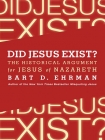Did Jesus Exist? - The Historical Argument for Jesus of Nazareth Bart Ehrman (books to read in your 20s txt) 📖

- Author: Bart Ehrman
Book online «Did Jesus Exist? - The Historical Argument for Jesus of Nazareth Bart Ehrman (books to read in your 20s txt) 📖». Author Bart Ehrman
Many early Christians rejected Mark’s Gospel as noncanonical (146). [Actually, Mark was everywhere accepted as canonical; in fact, every surviving Christian document that refers to it accepts its canonicity.]
Paul never mentions Jesus in his ethical teachings (152). [As we will see, this is simply wrong; see 1 Corinthians 7:10–11; 9:14; 11:22–24.]
The original version of Mark “did not include the resurrection at all” (156). [Not true. The original version of Mark does not have an episode in which Jesus appears to his disciples after the resurrection, but the text is completely unambiguous that Jesus has been raised from the dead. See, for example, Mark 16:6, which was an original part of the Gospel.]
Ancient Christians “of all persuasions,” including even the famous church historian Eusebius, did not accept the letters of 1 and 2 Timothy and Titus as part of their canon of scripture (161). [In point of fact, virtually everyone who mentions these letters accepts them as canonical, including Eusebius, who quotes them repeatedly in his writings.]
The word for spiritual gifts, charismata, is taken from “the Mystery term makarismos, referring to the blessed nature of one who has seen the Mysteries” (162). [They just made that up. The two words are etymologically unrelated. Charismata comes from the Greek word charisma, which means “gift.” It is not connected with the mystery religions.]
The Romans “completely destroyed the state of Judea in 112 CE” (178). [This is a bizarre claim. There was not even a war between Rome and Judea in 112 CE; there were wars in 66–70 and 132–35 CE.]
While it is useful to provide a taste of the sensationalist claims that one can find in this literature, I do not think that the serious authors who have pursued a mythicist agenda (for example, G. A. Wells, Robert Price, and now Richard Carrier) can be tarnished with the same brush or be condemned with guilt by association. Their work has to stand or fall on its own, independent of the foibles and shortcomings of the sensationalists. Those who have done research do indeed make a case that Jesus did not exist. Although they use some of the same arguments, they do not use the total package as those I’ve just mentioned. I will be dealing with these arguments at greater length later. First, however, I want to show the positive evidence that convinces everyone except the mythicists that Jesus existed. But to make sense of that evidence, I need at the very least to give a rough idea about why some of the smarter and better informed writers have said he did not exist.
The Basic Mythicist Position
THE CASE THAT MOST mythicists have made against the historical existence of Jesus involves both negative and positive arguments, with far more of the former.20
On the negative side, mythicists typically stress that there are no reliable references to the existence of Jesus in any non-Christian sources of the first century. Jesus allegedly lived until about the year 30 CE. But no Greek or Roman author (or any other non-Christian author, for that matter) mentions him for over eighty years after that. If Jesus was such an important figure—or even if he wasn’t so important—wouldn’t there be a reference to him in some of our many surviving sources from the first century? We have the writings of historians, politicians, philosophers, religion scholars, poets, and scientists; we have inscriptions placed on buildings and personal letters written by average people. In none of these non-Christian writings of the first century is Jesus ever mentioned, not even once.
It is typically argued by those who hold to Jesus’s historical existence that he is, in fact, mentioned by one author: the Jewish historian Josephus, who wrote a number of surviving books near the end of the first century. Mythicists, however, claim that the two references to Jesus in Josephus’s book Jewish Antiquities (these are the only two mentions of Jesus in all of Josephus’s abundant writings) were not written originally by Josephus but were inserted into his writings by later Christian scribes. If they are right, this would mean that we don’t have a single reference to Jesus in non-Christian texts before the writings of Pliny, a Roman governor of a province in what is now Turkey, in 112 CE and in the writings of the Roman historians Tacitus and Suetonius a few years later. Some mythicists claim that these references too were inserted into these writings, that they are not original. We will be looking at all of these references soon; for now it is enough to note that mythicists argue that it is hard to believe that Jesus would not be talked about, argued with, commented on, or even mentioned by writers of his own day or in the decades afterward if he really existed.
In addition, they typically claim that the historical Jesus does not appear prominently even in early Christian writings apart from the New Testament Gospels. In particular, they maintain that the apostle Paul says hardly anything about the historical Jesus or that he says nothing at all. This may come as a shock to most readers of the New Testament, but a careful reading of Paul’s letters shows the problems. Paul has a lot to say about Jesus’s death and resurrection—especially the resurrection—and he clearly worships him as his Lord. But he says very little indeed about anything that Jesus said and did while he was alive. Why would that be, if Jesus was in fact a historical person? Why doesn’t Paul quote the words of Jesus, such as the Sermon on the Mount? Why does he never refer to any of





Comments (0)